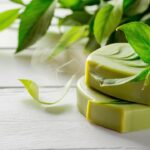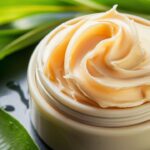Coconut oil soap is a popular choice for those seeking a cleansing and potentially beneficial bar. It’s made through a process called saponification, where coconut oil reacts with a lye solution to create soap.
Coconut oil soap is renowned for its rich, luxurious lather. Lauric acid in coconut oil readily converts into a cleansing agent called sodium laurate.
Coconut oil is often combined with other oils like olive oil or shea butter in soap recipes. These additional oils can help balance the cleansing power of coconut oil and offer added moisturizing properties.
benefits of coconut oil soap
Here are some of the coconut oil soap benefits
Nutritional Profile of Coconut Oil
Coconut oil is rich in medium-chain triglycerides, fatty acids, and some vitamins. However, during saponification, these components are chemically altered to create soap molecules. The resulting soap may not retain the original nutritional profile of the coconut oil.
The nutritional information you might find on some soap packaging refers to the unprocessed coconut oil used as a starting ingredient, not the final soap product.
While coconut oil soap itself isn’t a source of nutrients for your body, it can be a beneficial cleansing option depending on your skin type.
Facts About Coconut Oil for Stretch Marks Everyone Thinks Are True
Moisturizing Properties
coconut oil soap recipe excels at cleansing due to its high lauric acid content. Lauric acid converts into sodium laurate during saponification, creating a rich lather that effectively removes dirt, oil, and impurities.
coconut oil in its natural state possesses moisturizing properties. the saponification process transforms those properties into cleansing ones.
Antibacterial and Antifungal Properties
Coconut oil, in its natural state, is rich in lauric acid, a medium-chain fatty acid. Lauric acid has been shown to exhibit antibacterial properties against certain bacteria and fungi.
coconut oil in soap making undergoes a chemical reaction called saponification. During this process, lauric acid transforms into sodium laurate, the main cleansing agent in coconut oil soap.
Studies suggest that sodium laurate may retain some of the antibacterial properties of lauric acid. coconut oil soap might therefore be effective against certain bacteria, potentially aiding in reducing breakouts .
More research is needed to fully understand the extent of the antibacterial benefits of coconut oil soap on human skin.
Anti-Inflammatory Benefits
Coconut oil contains some fatty acids and other compounds that may possess anti-inflammatory properties. Studies suggest these components might help reduce inflammation caused by conditions like eczema or psoriasis.
There’s currently limited scientific research directly investigating the anti-inflammatory effects of coconut oil soap on human skin. While some anecdotal evidence suggests benefits, more studies are needed to confirm its effectiveness.
Soap Secrets: Why Homemade Soaps Are Your Skin’s New Best Friend
Anti-Aging Properties
The truth about coconut oil soap and anti-aging properties is a bit murky. Here’s a breakdown of the claims and the science behind them:
The Anti-Aging Allure:
Healthy, youthful-looking skin requires proper hydration. coconut oil itself boasts moisturizing properties.
the oil contains some antioxidants, which can help combat free radical damage. Free radicals contribute to the signs of aging like wrinkles and loss of elasticity.
a coconut oil soap recipe can also offer some indirect benefits that might contribute to a more youthful appearance. Its cleansing properties can help remove dirt, debris, and dead skin cells. the result is a brighter and smoother complexion.
Coconut Oil Soap for Different Skin Types
The effectiveness of coconut oil soap for different skin types is a mixed bag.
Oily Skin:
Coconut oil soap shines for oily skin. Its high lauric acid content translates into a rich lather that effectively removes excess oil and dirt.
While the cleansing power is beneficial, it can be a double-edged sword. Coconut oil soap can sometimes be drying, especially if used excessively.
Normal Skin:
Normal skin can potentially benefit from coconut oil soap in moderation. The cleansing power can help keep the skin clean without excessive dryness.
If you experience any tightness or dryness, using a different soap or a moisturizer after showering might be necessary.
Sensitive Skin:
coconut soap is Not recommended for sensitive skin. the soap may be irritating due to its potential to disrupt the skin’s natural moisture barrier.
Coconut Oil Soap in Your Skincare Routine
Coconut oil soap may be irritating for sensitive skin. Opt for a gentle, fragrance-free soap specifically formulated for sensitive skin.
Before incorporating any new soap, especially coconut oil soap, do a patch test on a small area of your forearm. Wait 24 hours to assess any irritation before using it on your entire face or body.
Create a rich lather and cleanse thoroughly, but avoid excessive scrubbing that can strip away natural oils.
Regardless of your skin type, consider applying a moisturizer after showering to replenish hydration.
frequently asked questions
What are the primary benefits of using coconut oil soap?
Coconut oil soap is renowned for its moisturizing properties, which help to hydrate and nourish the skin. It contains antioxidants and fatty acids that can aid in repairing the skin barrier, and reducing inflammation.
2. Is coconut oil soap suitable for all skin types?
Yes, coconut oil soap is generally suitable for all skin types, including sensitive skin. Its gentle formulation makes it ideal for those with dry, oily, or combination skin. However, individuals with extremely sensitive skin or specific allergies should perform a patch test before regular use.
Can coconut oil soap help with acne?
Because it is comedogenic, coconut oil may not be suitable for all acne-prone individuals. the oil could potentially clog pores in some cases.
Does coconut oil soap have a natural scent?
Yes, coconut oil soap often retains a mild, natural coconut scent. Some variations may have additional fragrances or essential oils added to enhance the aroma.
Is coconut oil soap safe for children?
Coconut oil soap is generally safe for children due to its gentle and natural ingredients. However, it is always best to consult with a pediatrician before introducing any new skincare product to a child’s routine.
How long does a bar of coconut oil soap last?
The longevity of a bar of coconut oil soap depends on its size and how frequently it is used. On average, a standard bar can last anywhere from 3 to 6 weeks with regular use. Proper storage, such as keeping the soap dry between uses, can help extend its lifespan.
Are there any side effects of using coconut oil soap?
coconut oil soap is generally safe and beneficial for most people. However, some individuals may experience allergic reactions or skin irritation. It’s essential to perform a patch test before using the soap.
Coconut Oil – Daily Do’s of Dermatology
https://www.youtube.com/watch?v=bSGb4mO3LpM
use reviews and testimonials
Dermatology Times Highlights user experiences and clinical trial results showing coconut oil’s effectiveness for skin therapy ➏
Many users report coconut oil helps with dry skin and conditions like eczema. They appreciate its natural composition and pleasant scent
User testimonials also praise the versatility of coconut oil, using it for moisturizing, and as a natural remedy for various skin conditions.
Have you tried coconut oil soap before? We’d love to hear about your experiences! Share your thoughts, stories, and any tips you have in the comments below.

I’m a devoted organic skincare enthusiast, passionate about the natural, wholesome goodness that organic products bring to our skin.
Organic skincare isn’t just a hobby for me—it’s a lifestyle. Every product I use, recommend, and write about has been carefully chosen for its purity and effectiveness. Everything I write about is backed by scientific studies, dermatologists’ opinions, and user experiences.
I also excel at tackling skincare challenges with innovative, organic solutions.

